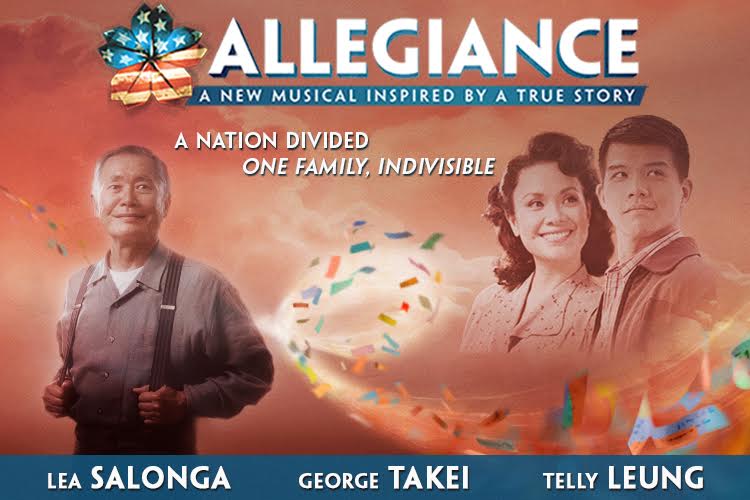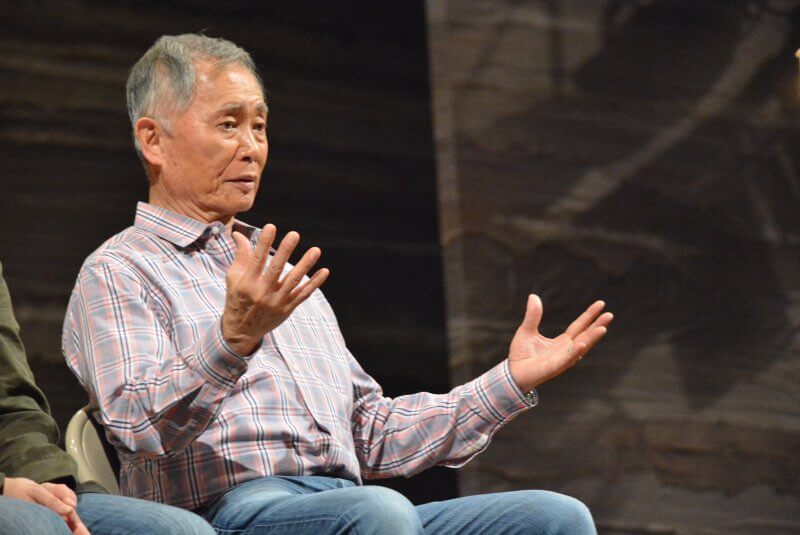
After a November performance at the Longacre Theatre in New York’s fabled Broadway district, AARP members were invited for a “talkback” with George Takei and other cast members answering questions about their powerful musical, “Allegiance.” (NOTE: This post was riginally uploaded to the AARP AAPI Community Facebook page.)
“I remember we started the school day, each day, with the Pledge of Allegiance to the flag. I could see the barbed wire fence and the sentry tower right outside my school house window as I recited the words, ‘with liberty, and justice for all.’”
Takei recalled his experience as a child, sent with his entire family to a concentration camp along with more than 110,000 people of Japanese descent – including, like Takei, half who were born in the US and therefore American citizens – during World War II.
Now, at age 78, Takei is pledging again, making his Broadway debut in “Allegiance,” which tells the story of Japanese American incarceration inspired by Takei’s childhood. The parallels between the 1940s incarceration and the national mood today are striking. The news is filled with politicians speaking out against accepting refugees from the Middle East, and some are stoking a palpable fear within the public over Muslims.
Takei has spoken out eloquently on his vast social media networks in response to the hate-filled climate – he even invited David Bowers, the mayor of Roanoke, Virginia to come see a performance of “Allegiance” after the mayor announced he didn’t want any Syrian refugees in his city, and cited the Japanese American incarceration as a model. The mayor said the threat from ISIS via refugees is “just as real and serious as that from our enemies then.”
Takei criticized the mayor for his “galling lack of compassion” and added, “…one of the reasons I am telling our story on Broadway eight times a week in ‘Allegiance’ is because of people like you. You who hold a position of authority and power, but you demonstrably have failed to learn the most basic of American civics or history lessons. So Mayor Bowers, I am officially inviting you to come see our show, as my personal guest. Perhaps you, too, will come away with more compassion and understanding.”
Educating the public about what happened to Japanese Americans during World War II, when 120,000 people of Japanese heritage (half were US-born American citizens) were removed from the West Coast and sent to nine concentration camps as far east as Arkansas, is one of Takei’s lifelong goals. His family spent the war years in Rowher, Arkansas.
“I’m always shocked when I tell the story (of Japanese American incarceration) to people that I consider well-informed,” he said, “and they’re shocked and aghast that sometime like this could happen in the United States. It’s still little-known. So, it’s been my mission to raise the awareness of this chapter of American history.”
“Allegiance” accomplishes Takei’s goal with Broadway grandeur that matches any hit musical, with songs that soar and tug at heartstrings, tight choreography and a storyline that is familiar to many Japanese Americans, but not to the public at large.
Continue reading →












